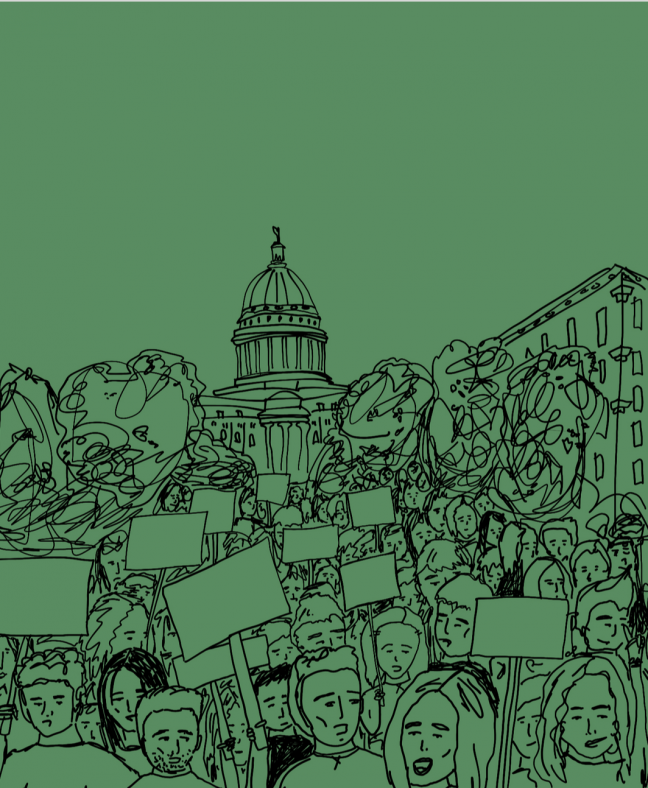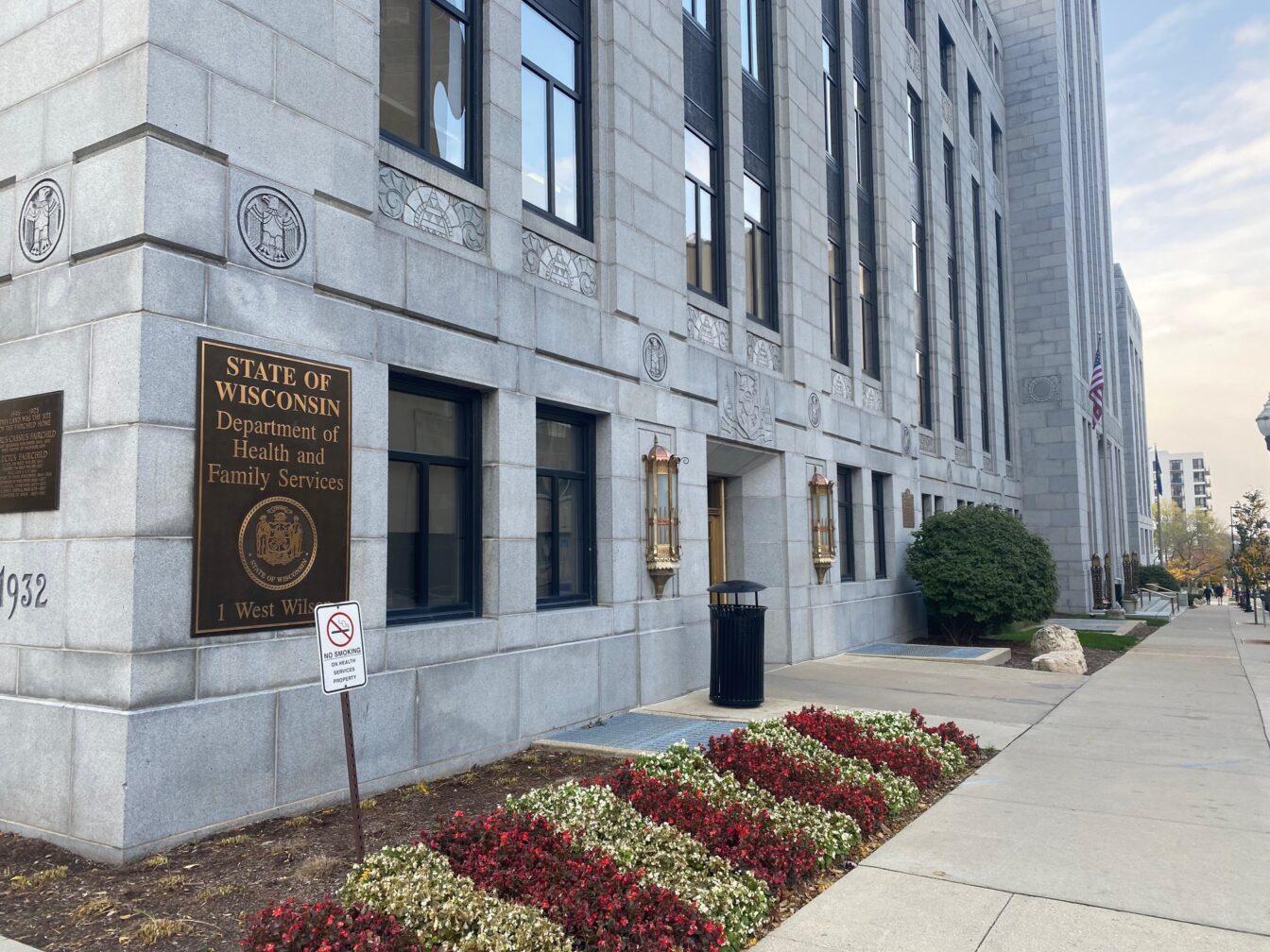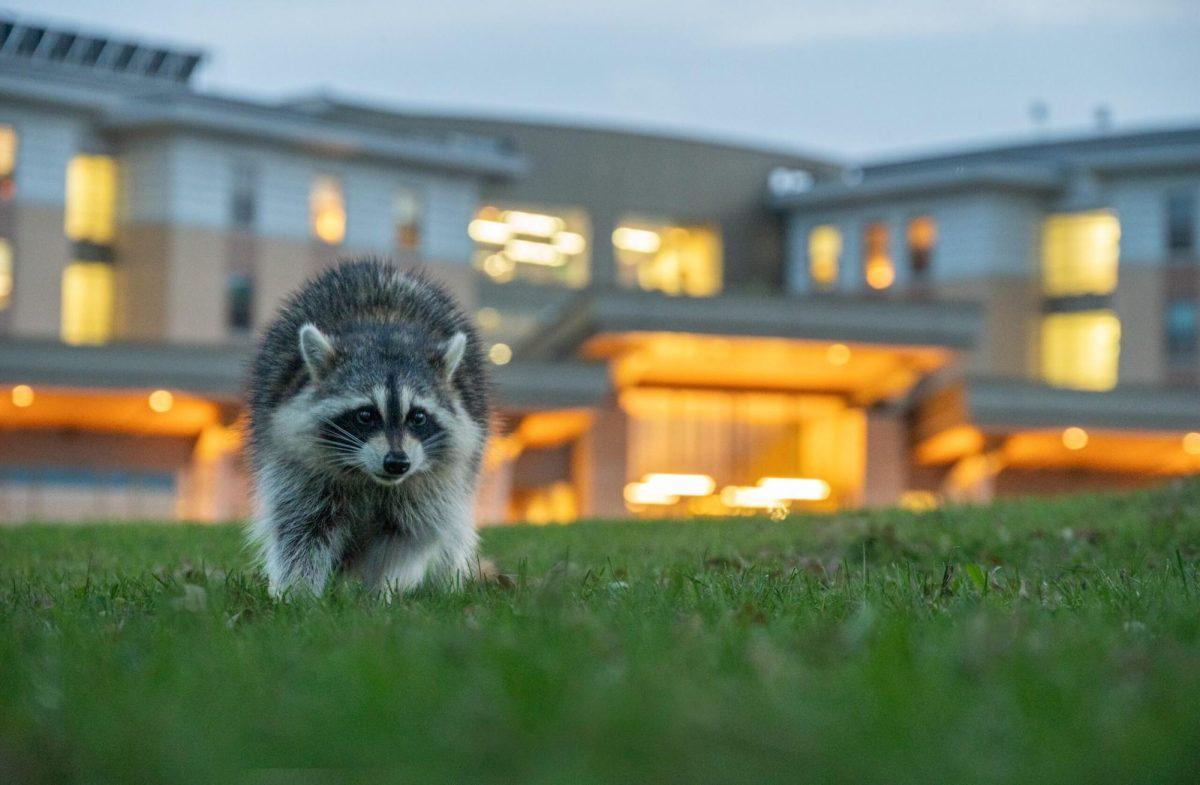Hundreds of people stand crowded atop the steps of the Wisconsin State Capitol. Most are young. Many hold painted signs with phrases like “We deserve the future,” or “Climate emergency!”
Sounds of the crowd chanting words like “you can’t drink oil, leave it in the soil,” and “the sea levels are rising, so are we,” ring through the air, as the group sprawls across the capitol lawn like a wildfire. Up on the steps, a projector screen displays the image of Greta Thurnberg, a 16-year-old Swedish climate activist who’s become the face of the international youth climate movement.
Though Thurnberg is speaking in New York City, her speech is broadcast throughout the world. With each point she makes, the Wisconsin crowd roars in support.
It’s clear Madison’s youth climate strike isn’t an isolated occurrence, limited to the space between the Madison Gas and Electric building and the capitol. Rather, it’s a global movement, the youth of cities around the world organizing together despite momentous distance.
The climate movement, which has shifted players, foci and direction throughout the years, is driven now by young activists pushing for immediate change. But in the U.S., partisan politics still saturate every facet of the issue.
Politics and research
Tristan L’Ecuyer is an atmospheric scientist at the University of Wisconsin. He studies computer models of climate to verify how accurate they are as predictors of our future. He described how, from a scientific perspective, the politicization of climate makes conducting and communicating research more difficult. He also said this politicization is relatively new.
“Climate change, when I first started, was more accepted [as an issue],” L’Ecuyer said. “There was a lot more widespread support for it. Then, I think we went through a period — and we’re still kind of in the end of that period, where it’s become more of a political issue than a scientific issue, which as a scientist is very difficult to deal with.”
L’Ecuyer got into climate science while studying theoretical physics. After deciding he wanted to work in a more applied field, he began studying precipitation and changing weather patterns.
When it comes to the politicization of the issue, L’Ecuyer said economics may be one root of the issue. He said many people who oppose climate change laws believe government regulations on carbon emissions and other business practices might dangerously expand the role of government in the U.S.
Plus, implementing green energy systems requires an initial economic investment, and L’Ecuyer said even if that investment ends up becoming more cost-effective in the long run, many people don’t want to put the money in up front.
“There’s a concept called future discounting, which everybody does,” L’Ecuyer said. “This is the same reason that people don’t save enough for retirement — people just devalue the value of $1 later in their lives than today. You want to have the money in your wallet now.”
UW geography professor and ecologist Jack Williams added that many administrations and organizations have realized the importance of investing in green energy solutions, in part because of shifting public perceptions about the issue, but also by riding the coattails of recent natural disasters like flooding and fires which have only been exacerbated by climate change.
Williams said Wisconsin has committed to carbon free energy sources by 2050, through an executive order by Gov. Tony Evers. Other states like Texas have planted large numbers of wind turbines, and many automakers continue to explore sources of clean energy.
“As you see things like stronger hurricanes in Texas, bigger fires in California, and more rain in Wisconsin, people are starting to realize that climate change has an impact,” Williams said. “And that something needs to be done.”
But even if some state administrations and organizations make progress toward clean energy, Williams said the federal level doesn’t reflect the same changes.
Atmospheric scientist Stephen Vavrus said on the federal level — the level many youth activists involved with the climate strike focus on — climate change research and climate policy proposals remain unsupported. He said the presidential administration, by taking the U.S. out of the Paris Climate Accords, reversed progress.
“Right now, at the national scale, the presidential scale, we’re not getting any support whatsoever from the president — in fact, the opposite,” Vavrus said. “Fortunately, we can still get a lot done, make progress in other areas. Typically, states and communities take up moving things forward on climate change preparation.”
Vavrus said the politicization of climate change also affects climate research from a solely scientific standpoint. Every researcher interviewed for this story explained that procuring funding in the first place is a huge barrier to conducting climate research.
Atmospheric scientist Michael Notaro acts as the assistant director for the Nelson Institute Center for Climatic Research. He said some executive and state-level administrations make it easier than others to secure funding for climate research. Without funding, researchers can’t pay their salaries, or the postdoctoral students and students who help conduct the research itself.
“Typically, submitting 15 to 20 page proposals — which take maybe a month to prepare — with a 10% success rate is pretty standard in our country. So it’s hard to get funding to do the research,” Notaro said. “Depending on who’s in office at the federal and state level, those challenges can increase or decrease — as we’ve seen.”
Williams described this problem as the U.S. “under-investing” in climate science. He said other countries like China and many European states prioritize funding for climate research while the U.S. does not.
Williams said one way to combat climate change in America’s current political atmosphere is to study the ecological effects of climate change in order to engineer cities and systems that are sustainable and resilient.
“There are things happening, but we need to invest more resources at a state level and on a national level in moving towards non-carbon energy sources, and towards improving climate adaptation,” Williams said.
Advocating for action
The climate change movement is nothing new — it has been a hot topic of discussion since the 1980s, L’Ecuyer and Vavrus said. But now the movement has a new face in 2019 — a much younger one.
Max Prestigiacomo and Sophie Guthier are only freshmen at UW, but on Sept. 20 they stood in front of a crowd of hundreds at the Capitol to speak during the climate strike.
“By characterizing the climate crisis as something that we still have time to solve, we provide a false sense of optimism,” Prestigiacomo said to the crowd. “This fatal lapse in reality will continue to perpetuate our sleepwalk into mass extinction. Unless we act.”
UW freshman Crystal Zhao also spoke at the rally. Zhao recounted some of her experiences living abroad — she grew up in China, but also spent several years studying on a ship and sailing to countries across the Atlantic Ocean.
Zhao said she’d seen the effects of climate in her travels, from dense factory smoke polluting the air outside her childhood home to plastic washing up on beaches in Cabo to the point that she couldn’t even walk across the sand.
“I’m here today, because what we humans are doing to this planet is short sighted. And I’m frustrated,” Zhao said. “Our house is on fire. We need to recognize that there is a fire, and we can still put it out. It is not beyond our control to save our only hope. At least not yet.”
Several student organizations on the UW campus have taken matters into their own hands when it comes to making the campus more sustainable. One, called ReThink, directs several different projects from reducing restaurant waste to educating others about compost.
Jo Annin, a junior at UW majoring in environmental studies, is the Co-Chair of ReThink. She said her organization focuses on positive change, instead of drawing out the potential negatives of climate change, in order to make progress however possible.
“There’s so much out there in the environmental world that is so depressing — and it’s important, that stuff’s really important — but I think it’s also important to have an outlet to actually do something,” Annin said.
Since their founding in 2008, ReThink has transformed from a waste management club to an organization with a much broader mission statement. Annin explained that the organization works to advocate for change as well as implements sustainable practices on campus and in Madison. Annin, who joined as a freshman, said she’s excited to see what ReThink will do in the future.
L’Ecuyer also talked about the importance of collaborating and making change, instead of getting caught up in fear and paralyzing statistics. He said a sense of urgency is important, especially when people can see firsthand flooding and other physical effects of climate change, but that it’s also important to tell people what they can do to help prevent further damage.
“I think there’s been a little bit of hyperbole — or whatever you want to call it — a little bit of doom and gloom kind of messaging,” L’Ecuyer said. “I just don’t think that that resonates as well with people than saying ‘look, you can have a positive impact on the climate by doing this.’”
Communicating climate
Intersecting science, politics and activism is communication — one of the most important facets of the climate change issue — L’Ecuyer said.
L’Ecuyer said one of the biggest communication divides exists between the general public and scientists. Often, he said, scientists aren’t equipped with the necessary skills to communicate their research to general audiences. Instead, most focus on communicating with their colleagues, who all have the same education and background needed to understand high-level research and its implications.
To this end, L’Ecuyer suggested training incoming researchers and students about how to communicate their research in an easy-to-understand way.
“I think this has been something that we’re working on — educating our new upcoming students, and maybe even existing scientists on how to communicate their science in a way that people can understand,” L’Ecuyer said.
Notaro agreed with the importance of communication education. He conducts outreach with middle and high school teachers from rural Wisconsin areas, running workshops to help teachers understand climate change and the best ways to integrate it into their curriculum.
Notaro said the program exemplifies the Wisconsin Idea by bringing UW research to these communities in a useful way. It also allows teachers to learn, students to study their local environments and both to meet firsthand with scientists, he said. Many of the schools partake in a program run by NASA, where students collect data samples and send them to NASA to help the agency validate their satellite data, Notaro said.
“Schools in general — in Wisconsin and in our country — often feel under-prepared to teach climate change and climate science,” Notaro said. “So our goal is to both provide that training to the schools and provide the schools and the students opportunities to meet with and work with scientists.”
When it comes to devising solutions to climate issues, Notaro said one communication strategy he’s seen work successfully is simply not acknowledging the source of the problem and focusing on collaborating to fix an existing situation.
Notaro said the Wisconsin Initiative on Climate Change Impacts used this strategy to address extreme flooding in Wisconsin.
“If you appeal to a more conservative political group, sometimes you can present it in the way that you’re trying to strengthen your resource resilience in light of climate variability, or even a change in climate,” Notaro said. “But you’re not necessarily pointing fingers at a source of climate change.”
While Notaro and many of the other scientists may be hesitant to “point fingers” when it comes to trying to communicate climate issues, youth activists use their platform to address the underlying human causes of climate change right out of the gate.
Both Prestigiacomo and Guthier’s speeches at the climate rally called for more than local measures to work toward sustainable energy. They spoke about the need for greater societal change, for systemic overhaul and for a “paradigm shift.”
Guthier addressed the demographic history of the climate movement. She said sociological dynamics continue to support white platforms, even though the roots of the movement trace back to indigenous communities and communities of color. She also acknowledged capitalism, a structure she said caused the climate crisis, which makes the issue inherently political.
“This movement is not about going vegan, it is not about plastic straws. It is about structural change,” Guthier said.
Both the youth activists and Williams brought up communicating and advocating by engaging in democratic activity, specifically voting or writing to local representatives about these issues.
Earlier this year, University College London professor Tali Sharot said in an interview with National Public Radio that fear functions as a powerful motivator for inaction, while hope works to motivate and inspire people to action. When mentioned to L’Ecuyer, he agreed, reiterating the importance of positive messaging.
“When you have years worth of events that all seem to be a little bit more extreme than they have in the past, you can project forward and say, ‘you know, this is going to be a difficult climate for us to live in, if we keep going down this path,’” L’Ecuyer said. “But I usually try to turn around and see that if we do something now, we don’t have to have that reality. We can make a change.”














